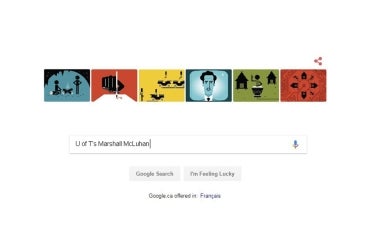Google Doodle celebrates 106th birthday of U of T’s Marshall McLuhan

Published: July 21, 2017
Today’s Google Doodle is celebrating the 106th birthday of famed University of Toronto professor and media theorist Marshall McLuhan.
McLuhan rose to fame in the 1960s when his theories about mass media and technology earned him celebrity fans including John Lennon and Pierre Trudeau.
At U of T, McLuhan was a fixture at the Coach House Institute, now renamed McLuhan Centre for Culture and Technology in the Faculty of Information.
Read more about the McLuhan Centre
U of T News spoke with the centre’s director, Associate Professor Sarah Sharma, about McLuhan’s influence and the centre’s big plans for the upcoming year.
What was your reaction when you saw the Google Doodle this morning?
I knew it was going to happen, and I'm such a geek – I tried to stay up until midnight to see it. I thought it was fantastic, and I thought that it puts to rest the question once and for all if McLuhan needs to be revived, or if he's relevant or not. He's completely relevant – we don't need to have that conversation anymore.
It seems so appropriate for him to be a Google Doodle, considering his theories in many ways predicted Internet culture.
Having him as an entry into the search portal is uncanny – in some ways, you can imagine he would always be the Google Doodle. Even the images they're using completely predate the Internet – they're showing the typographic man and television. You can see going through the search engine that it's all related. The Internet didn't just begin on its own. It's part of this larger history of other media technology, and that's part of his argument too.
Most of his popular aphorisms like the global village, the medium is the message, that the Internet would retribalize people are the biggest connections somebody would draw.

What should we be talking about when it comes to bringing McLuhan's ideas forward?
He's associated with these aphorisms, but I'm hoping his legacy is a continuation of what he wanted to do at the centre – to study digital and cultural life, rather than go back through what he said.
We're never going to replace McLuhan – he [and his theories are] bigger than the Google Doodle, bigger than Google, bigger than the McLuhan Centre.
What are U of T and the McLuhan Centre doing to continue his work?
I have this original document of his that draws out what he wanted to establish as a media centre at U of T. I'd like to honour his legacy by having the centre continuing to do the work he wanted the centre to do, such as continuing to inspire new scholars and new ideas on technology.
In the last few years, U of T has hired so many media studies theorists on all three campuses, and I've been trying to establish the centre as home to the type of work McLuhan inspired. These are people across the campuses that have a profound understanding of the power of the media. When you read him, it alters the way you see the world – you can't look at it in the same way. We need to continue to read him in order to understand how to even think about the relationship between technology and culture.
He was weird for his time, and he did weird work on technology. I want the McLuhan Centre to carry on this weird work.
The centre is focusing its work on the theme MsUnderstanding Media: The Extensions of Woman – what will it be exploring?
MsUnderstanding is the first theme I'm doing. When we keep returning to something he said, we miss all the opportunities. Feminist scholars and scholars of race and technology have been doing his work – they've done the critical project which I find gets lost when we just celebrate the man.
Next year, we're revisiting his question of extensions of man and reformulating it to extensions of women. I'm not disputing him. I'm looking to say, “What happens if we relook at some of his objects but through a feminist lens.”
If we want to do what he was doing, we need to have our fingers on the pulse. We don't need to be the technological innovators, but we need to think about where those things are going. He recognized the dangers in them, the rise of particular types of characters in society – and we need to do that work with our new technological infrastructure.
Are there any events to look forward to in the next year?
There will be the Monday night seminars, a few different symposia, an event on robots and intimacy. The schedule for events will be announced in August.
(Photo of Marshall McLuhan via U of T archives)



